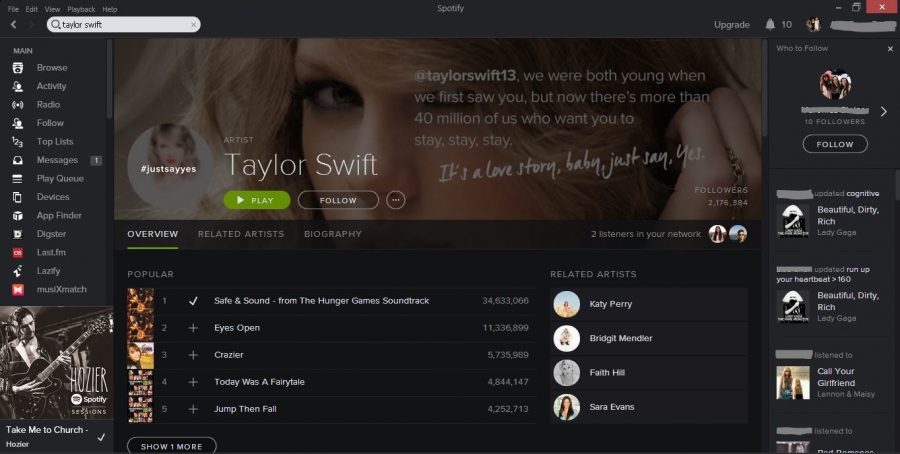
Staff Writers
In 2012, Taylor Swift’s Red album release amassed a whopping earning of around $55 million. Following her incredible success, Swift released a new album titled 1989 on October 27 of this year through Big Machine Records. 1989 had tremendous success, selling over 1.2 million copies in its first week, but promptly following her album release, Swift made the polarizing decision on November 3 to pull her music, initially with the exception of one song before taking that song down as well, from the free streaming website, Spotify.
In an interview with Yahoo! Music, Swift said, “Music is changing so quickly, and the landscape of the music industry itself is changing so quickly, that everything new, like Spotify, all feels to me a bit like a grand experiment… And I’m not willing to contribute my life’s work to an experiment that I don’t feel fairly compensates the writers, producers, artists and creators of this music. And I just don’t agree with perpetuating the perception that music has no value and should be free.”
According to Swift, the reasons behind her decision to make her music only available through purchase was not monetary; Swift merely believes in just compensation of artists for their work. However, while Swift claims that the decision was not based on compensational mires, she contradictorily says in an interview with the Wall Street Journal that “Music is art, and art is important and rare. Important, rare things are valuable. Valuable things should be paid for. It’s my opinion that music should not be free, and my prediction is that individual artists and their labels will someday decide what an album’s price point is. I hope they don’t underestimate themselves or undervalue their art.” Okay, but what is fair compensation? When Swift released her album Red, it was available for streaming on Spotify, and the young 24 year-old was able to make more than $50 million. How much more “fair compensation” is Taylor Swift looking for?
As stated on Spotify’s website, there is “an average ‘per stream’ payout to rights holders of between $0.006 and $0.0084.” Spotify CEO, Daniel Ek, reported on CNN that “payouts for a top artist like Taylor Swift (before she pulled her catalog) are on track to exceed $6 million a year.” Clearly the problem is not compensation. Swift undermines her own argument by implying that she is creating art that is not being thoroughly acknowledged. Swift seems to be ignoring the fact that to buy every single song can be extremely expensive, and Spotify provides fans with a point of access from which to enjoy free music without hurting artists.
It is not as though Swift is being cheated out of her livelihood. She is simply not being paid to her standards. Ultimately, although Taylor claims that her decision is purely ethical–that it is only fair for artists to be paid more for their work–Swift fails to keep her fans’ best interest at heart.
Taylor Swift pulls music from Spotify
December 3, 2014
0
Donate to Sword & Shield
$180
$1000
Contributed
Our Goal
Your donation will support the student journalists of University High School. Your contribution will allow us to purchase equipment and cover our annual website hosting costs.
More to Discover














